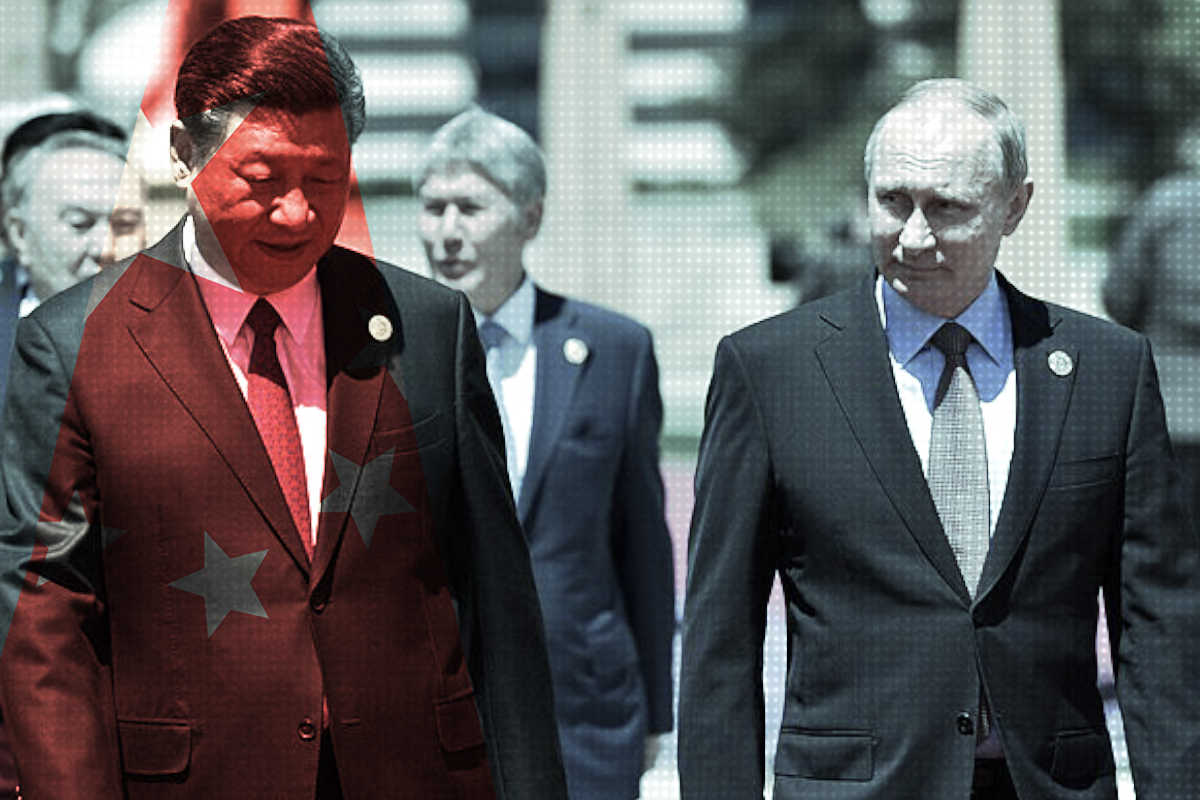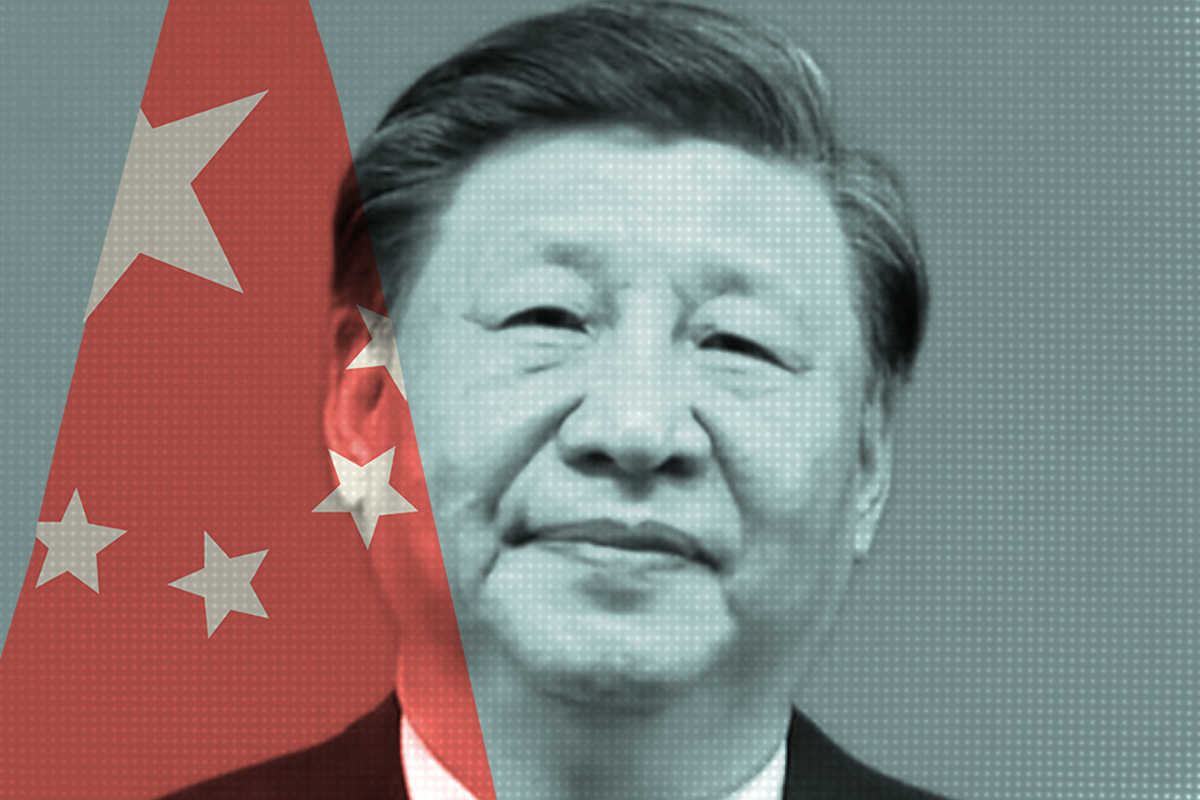CMP reported yesterday on the firestorm that ensued online in China as news circulated that Wuhan’s top official, Wang Zhonglin (王忠林), said during an internal meeting that the city needed to “carry out gratitude education among the citizens of the whole city” so that they thank Xi Jinping and the Communist Party of China for the response to the coronavirus epidemic.
Internal directives from press control officials now suggest this has been a full-blown public opinion crisis for the Party, and that the wound was self-inflicted. Media have been ordered not to share the original article, publish commentaries, or otherwise address the issue at all. The report on Wang’s remarks by Wuhan’s official Changjiang Daily has been withdrawn, but remains available online from certain sources.
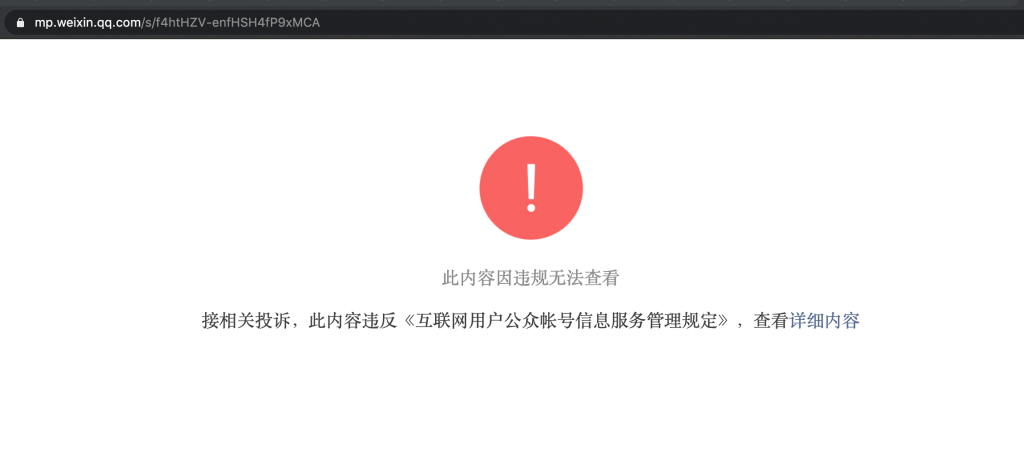
Below is CMP’s translation of an announcement for an internal propaganda meeting held last night, with required attendance from key central Party media and local propaganda offices. The announcement clearly says that what it now calls the “’gratitude education’ incident” invited “raging public opinion,” and that it was comparable as a “public opinion incident” to the uproar that followed the death of Dr. Li Wenliang.
The coronavirus epidemic has been a serious test of the Chinese Communist Party’s capacity to “guide public opinion,” a phrase it uses to describe the work of controlling and redirecting information in order to maintain political stability and the Party’s legitimacy in the eyes of the public. Efforts by an often rigid and unresponsive Party-state media system to turn the tide of criticism away from the government have often backfired, encouraging anger and resentment with the leadership’s apparent interest in managing appearances over acknowledging and grappling with problems.
One of the most obvious cases in point came last Friday as footage emerged online and on social media of residents in Wuhan shouting from their high-rise apartments during an inspection visit by vice-premier Sun Chunlan: “Fake! Fake! Everything is fake!” It was possibly this embarrassing episode that prompted Wang Zhonglin, who was appointed in February to replace Ma Guoqiang (马国强) as Wuhan’s Party secretary in a leadership shake-up, to suggest the necessity of a campaign of “gratitude education.”
The internal announcement on the “’gratitude education’ incident” urges all media to “consider the feelings of the people of Wuhan” in news and propaganda reports. But the focus remains, unsurprisingly, on the end goal of “easing the emotions of the people”—as though public opinion itself is the primary challenge. The announcement stresses the importance, in this regard, of a special series called “Entering Communities, Listening to People’s Voices, Alleviating People’s Concerns” (进社区, 听民声, 解民忧).
We can find this phrase being deployed already in Wuhan, and it appears on the front page of today’s Changjiang Daily. The following image is from the lower right-hand corner, pointing readers to page 3.
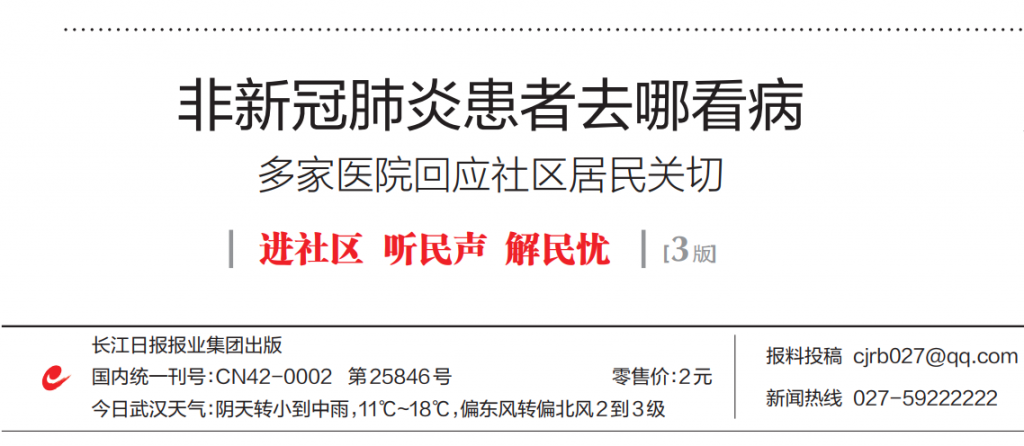
Page 3 is a full page of more informational content about the coronavirus epidemic in the city, under the headline: “Where Do Non-Coronavirus Patients Seek Medical Care, and How.” The subhead seems almost pleading in light of the insistence in the internal announcement (below) that media focus on alleviating the concerns of the public: “Bearing Concern for Community Residents, We Asked 4 Hospitals.”
A series of articles follows on the left-hand side explaining the situation at various local hospitals. Vertically across the right-hand side are questions from readers that are answered by the newspaper. One reader asks, for example, what to do if his annual vehicle inspection for his driver’s license is due but not possible owing to suspension of such services. The response explains that drivers in this situation will not be fined by transport authorities for such violations during the quarantine period.
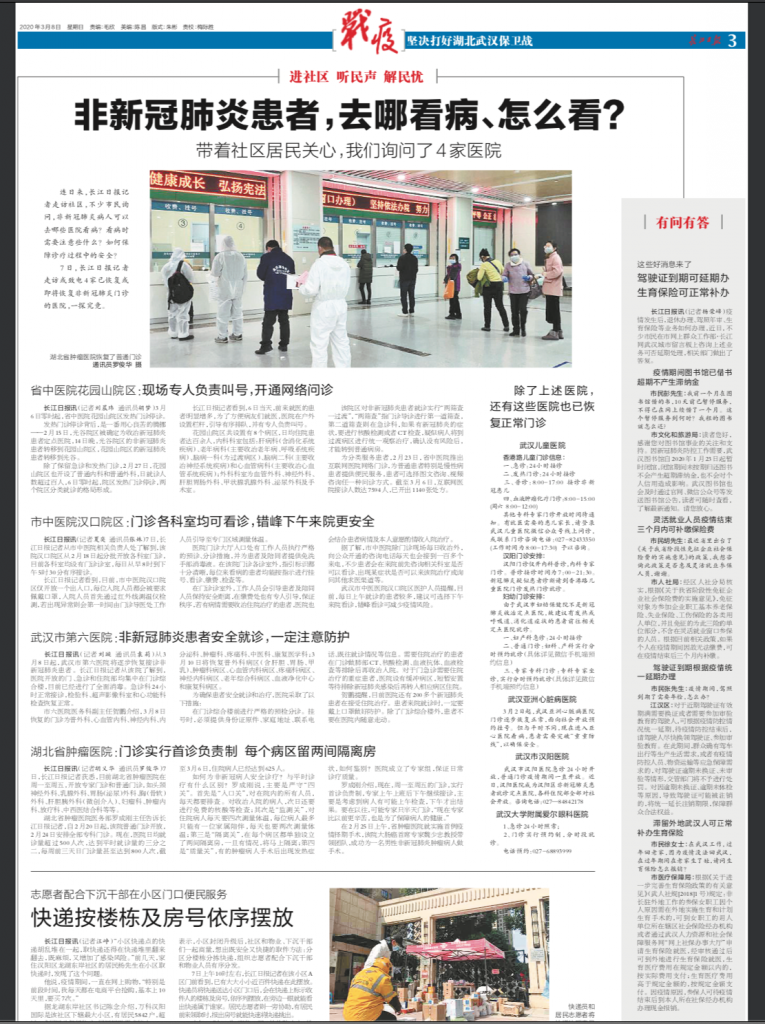
These are certainly interesting times to observe the mechanics of press control and “public opinion guidance” in China.
____________
March 7, 2020
21:15-21:50
Host: State Council Information Office
Principal Participating Units: People’s Daily, Xinhua News Agency, Guangming Daily, China Central Television, The Paper, Economic Daily, China Youth Daily, Guangdong Propaganda Department, Hubei Propaganda Department, Propaganda Department of Wuhan City, and others.
1. Notice on the situation concerning the “gratitude education” incident, providing an internal grasp
Today Changjiang Daily’s report on “gratitude education” invited raging public opinion (舆情汹通), the intensity of the public opinion response being similar to that following the death of a certain doctor. Through communications between provincial and city leaders, and after a request to central authorities it was agreed: Changjiang Daily, [the WeChat account] Wuhan China (武汉发布) and Wuhan Television will remove the article at its source, and no other media will be permitted to follow-up with reports or commentaries!
This matter is a classic case of public opinion created by our own work (自身工作), in particular an insufficiently strict hold at Changjiang Daily, and[we] must draw lessons from this, and reflect back seriously.
On this matter, Minister [Huang] Kunming (黄坤明) [of the Central Propaganda Department] especially made a phone call to stress: This matter fully shows that with Wuhan now having been shut down for more than 40 days, the lives of the ordinary people have been affected to such an extent that there is resentment and anger, and all reports must consider the feelings of the people of Wuhan. This matter also sounds a warning to all of our media, that they must definitely consider the particular situation facing Wuhan and the feelings of the people.
The immense reaction created by this incident again shows the significance and importance of our running the special series “Entering Communities, Listening to People’s Voices, Alleviating People’s Concerns,”easing the emotions of the people – not to teach the people gratitude, but to alleviate their concerns.
Here we warn particularly: all media, regardless of whether in internal reporting (内宣) or external propaganda (外宣), regardless of whether they are central or local media, regardless of whether they are online or offline, must heed the calls [of the CCP], must all be strategically aligned in their consciousness, forming a coordinated unit of struggle (战斗部队), and must not fight independently.
[Featured Image: Screenshot of video from Apple Daily on Wang Zhonglin touring Wuhan.]



















